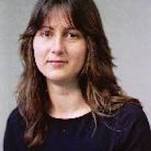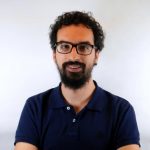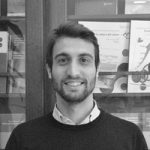 Roberto Trasarti – CNR
Roberto Trasarti – CNR
Roberto Trasarti was born in 1979 in Italy. He graduated in Computer Science in 2006, at the University of Pisa. He discussed his thesis on ConQueSt: a Constraint-based Query System aimed at supporting frequent patterns discovery. He started the Ph.D. in Computer Science at the School for Graduate Studies “Galileo Galilei”, (University of Pisa). In June 2010 he received his Ph.D. presenting the thesis entitled “Mastering the Spatio-Temporal Knowledge Discovery Process”. He is currently a member of ISTI-CNR, and also a member of Knowledge Discovery and Delivery Laboratory. His interests regard Data mining, Spatio-Temporal data analysis, Artificial intelligence, Automatic Reasoning.
 Fosca Giannotti – CNR
Fosca Giannotti – CNR
Fosca Giannotti is a director of research of computer science at the Information Science and Technology Institute “A. Faedo” of the National Research Council, Pisa, Italy. Fosca Giannotti is a pioneering scientist in mobility data mining, social network analysis and privacy-preserving data mining. Fosca leads the Pisa KDD Lab – Knowledge Discovery and Data Mining Laboratory, a joint research initiative of the University of Pisa and ISTI-CNR, founded in 1994 as one of the earliest research lab on data mining. Fosca’s research focus is on social mining from big data: smart cities, human dynamics, social and economic networks, ethics and trust, diffusion of innovations. She is author of more than 300 papers. She has coordinated tens of European projects and industrial collaborations. Fosca is currently the coordinator of SoBigData(link is external), the European research infrastructure on Big Data Analytics and Social Mining, an ecosystem of ten cutting edge European research centres providing an open platform for interdisciplinary data science and data-driven innovation. Recently she became the recipient of a prestigious ERC Advanced Grant entitled XAI – Science and technology for the explanation of AI decision making.
 Kalina Bontcheva – USFD
Kalina Bontcheva – USFD
Professor Kalina Bontcheva is a senior researcher in the Natural Language Processing Group. From October 2015 she has been working on an EPSRC Career Acceleration Felllowship on summarisation of social media.
 Dino Pedreschi – UNIPI
Dino Pedreschi – UNIPI
Dino Pedreschi is a Professor of Computer Science at the University of Pisa, and a pioneering scientist in mobility data mining, social network mining and privacy-preserving data mining. He co-leads with Fosca Giannotti the Pisa KDD Lab – Knowledge Discovery and Data Mining Laboratory, a joint research initiative of the University of Pisa and the Information Science and Technology Institute of the Italian National Research Council, one of the earliest research lab centered on data mining. His research focus is on big data analytics and mining and their impact on society. He is a founder of the Business Informatics MSc program at Univ. Pisa, a course targeted at the education of interdisciplinary data scientists. Dino has been a visiting scientist at Barabasi Lab (Center for Complex Network Research) of Northeastern University, Boston (2009-2010), and earlier at the University of Texas at Austin (1989-90), at CWI Amsterdam (1993) and at UCLA (1995). In 2009, Dino received a Google Research Award for his research on privacy-preserving data mining.
 Valerio Grossi – CNR
Valerio Grossi – CNR
Valerio Grossi holds a Ph.D. in Computer Science from the University of Pisa. His research interests focus on the analysis of massive and complex data including mining data streams, ontology-driven mining, business intelligence and knowledge discovery systems. He took part in several European research projects as a member of the UNIPI research group, among which figure BRITE (Business Register Interoperability throughout Europe), MUSING (MUlti-industry, Semantic-based next generation business INtelliGence) and ICON (Inductive Constraint Programming), where he focused on the development of brand new data mining and knowledge discovery applications and on the research for the development of new business intelligence approaches.
 Ilaria Barsanti – CNR
Ilaria Barsanti – CNR
 Michela Natilli – CNR
Michela Natilli – CNR
Statistician, graduated in Statistics and Economics at University of Siena in 2001. She’s got a master of Science (M.Sc.) from University of Pisa in Big Data Analytics and Social Mining in 2015. Her current research interests are Food Analytics and Gender studies
 Daniele Fadda – CNR
Daniele Fadda – CNR
Information designer, graduated in Communication Design at the Politecnico di Milano in 2010. He’s got a master of Science (M.Sc.) from University of Pisa in Big Data Analytics and Social Mining in 2015. His current research interests are Mobility Data Analysis, Data Visualization for complex systems and Visual Analytics methods for Big Data.
He has been involved in several EU funded projects.
 Vittorio Romano – CNR
Vittorio Romano – CNR
Vittorio Romano was born in Reggio di Calabria (Italy) in 1973 and holds a Bachelor Degree in Computer Science at the University of Pisa and a Master Degree in Computer Science at the University of Pisa.
His main interest is in web applications, CMS and communications on social networks. In the KDD lab he is active in building, managing and developing the websites and the content management systems used to support researchers in the dissemination of their activities, in supporting other researchers in as a software developer and programmer, in the system administration of the shared resources, in organizing events, in providing an interface between other researchers and the administration and as a support to visitors and students. Within the SoBigData project his activities are related to the development of the websites and their integration with the Research Infrastructure, to the communication on web/social, to the workpakages working on ethics and on the data ecosystem, to the organization of events and to support the administration. His contribution to the Trigger Project was the design and implementation of a website showing useful visualizations about the carriers of female researchers at the University of Pisa.
 Roberto Trasarti – CNR
Roberto Trasarti – CNR
Roberto Trasarti was born in 1979 in Italy. He graduated in Computer Science in 2006, at the University of Pisa. He discussed his thesis on ConQueSt: a Constraint-based Query System aimed at supporting frequent patterns discovery. He started the Ph.D. in Computer Science at the School for Graduate Studies “Galileo Galilei”, (University of Pisa). In June 2010 he received his Ph.D. presenting the thesis entitled “Mastering the Spatio-Temporal Knowledge Discovery Process”. He is currently a member of ISTI-CNR, and also a member of Knowledge Discovery and Delivery Laboratory. His interests regard Data mining, Spatio-Temporal data analysis, Artificial intelligence, Automatic Reasoning.
 Jeroen van den Hoven – TUDelft
Jeroen van den Hoven – TUDelft
Jeroen van den Hoven is university professor and full professor of Ethics and Technology at Delft University of Technology and editor in chief of Ethics and Information Technology. He is currently the scientific director of the Delft Design for Values Institute. He was the founding scientific director of 4TU.Centre for Ethics and Technology (2007-2013). In 2009, he won the World Technology Award for Ethics as well as the IFIP prize for ICT and Society for his work in Ethics and ICT. Jeroen van den Hoven was founder, and until 2016 Programme Chair, of the program of the Dutch Research Council on Responsible Innovation. He published Designing in Ethics (Van den Hoven, Miller & Pogge eds., Cambridge University Press, 2017) and Evil Online (Cocking & Van den Hoven, Blackwell, 2018) He is a permanent member of the European Group on Ethics (EGE) to the European Commission. In 2017 he was knighted in the Order of the Lion of The Netherlands.
 Juan Durán – TUDelft
Juan Durán – TUDelft
I studied computer science and philosophy at the National University of Córdoba (Argentina). During this time, I worked at the National Space Activities Commission (Argentina) on several projects, including software engineering and programming neural networks, parallel processing, and remote sensing. I obtained my PhD at the Cluster of Excellence SimTech – University of Stuttgart (Germany). Before joining TU Delft, I was a research associate at the High Performance Computing Centre Stuttgart, University of Stuttgart.
 Kalina Bontcheva – USFD
Kalina Bontcheva – USFD
Professor Kalina Bontcheva is a senior researcher in the Natural Language Processing Group. From October 2015 she has been working on an EPSRC Career Acceleration Felllowship on summarisation of social media.
 Mark Coté – KCL
Mark Coté – KCL
Mark is a research-led academic with a pioneering cross-disciplinary vision that scans both the human and technical object in order to understand the societal dimensions of data, computation and AI. He has been PI or CI on EPSRC, H2020, and AHRC grants valued at more than £10 million. He collaborates with computer scientists in social data analytics and cybersecurity, social scientists and policy experts and legal scholars.
He is a PI and Strategic Board member of REPHRAIN, the UK’s national research centre for online harm mitigation and data empowerment, and a PI on SoBigData, the European research infrastructure for social data analytics. He has collaborated with the Open Data Institute, British Library, the University of Pisa, Tactical Tech Collective and many others. He has presented his research at the British Academy, the European Parliament, the International Communication Association, the Royal Society, the Italian National Research Council, and many others.
His work has been published widely in leading journals across disciplines including Big Data & Society and the IEEE Computer. His innovative leadership in research-led teaching and curriculum development is demonstrated in the MA Data Culture and Society.
 Nicola Del Sarto – SSSA
Nicola Del Sarto – SSSA
Nicola Del Sarto is a post-doctoral research fellow at Scuola Superiore Sant’Anna in Pisa. He received a Ph.D in Management of Innovation, sustainability and healthcare from Scuola Superiore Sant’Anna in 2019. Nicola’s research interests focus on small businesses and start-ups and support mechanisms such as incubators, accelerators and corporate accelerator programs. Moreover, he is investigating the processes of business creation under the Open Innovation paradigm. Nicola holds a Master degree in economics from University of Pisa and a post graduate master in Management, innovation and engineering of services from Scuola Superiore Sant’Anna. Nicola’s work has been published in high-quality peer reviewed journals and presented at international conferences.
 Kalina Bontcheva – USFD
Kalina Bontcheva – USFD
Professor Kalina Bontcheva is a senior researcher in the Natural Language Processing Group. From October 2015 she has been working on an EPSRC Career Acceleration Felllowship on summarisation of social media.
 Valerio Grossi – CNR
Valerio Grossi – CNR
Valerio Grossi holds a Ph.D. in Computer Science from the University of Pisa. His research interests focus on the analysis of massive and complex data including mining data streams, ontology-driven mining, business intelligence and knowledge discovery systems. He took part in several European research projects as a member of the UNIPI research group, among which figure BRITE (Business Register Interoperability throughout Europe), MUSING (MUlti-industry, Semantic-based next generation business INtelliGence) and ICON (Inductive Constraint Programming), where he focused on the development of brand new data mining and knowledge discovery applications and on the research for the development of new business intelligence approaches.
 Avishek Anand – LUH
Avishek Anand – LUH
Avishek Anand is an Assistant Professor in the Leibniz University of Hannover. His research aims to develop intelligent and transparent machine learning approaches to help humans find relevant information. His research broadly falls in the intersection of Machine learning on Web and information retrieval. Specifically, he is interested in scalable and interpretable representation learning methods for text and graphs. He holds a PhD in computer science from the Max Planck Insitute for Informatics, Saarbrücken. His research is supported by Amazon research awards and Schufa Gmbh. He has been a visiting scholar in Amazon Search.
 Giulio Rossetti – CNR
Giulio Rossetti – CNR
Giulio’s research activity started in 2011 and centers on the definition of algorithms for complex network analysis and data science. In particular, his recent research focuses on the modeling and study of dynamics of and on network topologies (dynamic community discovery, diffusion/spreading phenomena modeling) and the definition of data-driven models for the forecast of rare events.
 Pasquale Pagano – CNR
Pasquale Pagano – CNR
Senior Researcher at the Networked Multimedia Information Systems Laboratory of the “Istituto di Scienza e Tecnologie della Informazione A. Faedo” (ISTI) of the Italian National Research Council (CNR). I received my M.Sc. in Information Systems Technologies from the Department of Computer Science of the University of Pisa (1998), and the Ph.D. degree in Information Engineering from the Department of Information Engineering: Electronics, Information Theory, Telecommunications of the same university (2006). The aim of my research is the study and experimentation of models, methodologies and techniques for the design and development of distributed virtual research environments (VREs) which require the handling of heterogeneous resources provided by Grid and Cloud based e-Infrastructures. I have a strong background on distributed architectures. I participated to the design of the most relevant distributed systems and e-Infrastructure enabling middleware developed by ISTI – CNR.
 Aristides Gionis – KTH
Aristides Gionis – KTH
I am a WASP professor at KTH Royal Institute of Technology and an adjunct professor at Aalto University. I work in algorithms, data mining, graph mining, and social-network analysis.
 Luca Pappalardo – CNR
Luca Pappalardo – CNR
Born in Salerno (Italy), I earned my PhD in Computer Science at University of Pisa with the thesis “Human Mobility, Social Networks and Economic Development: a Data Science perspective”. In my research, I exploit the power of Big Data to study many aspects of human behavior: the patterns of human mobility, the structure and evolution of complex networks, the patterns of success in sports, and the usage of data-driven measures of human behavior to monitor and predict the economic development of countries, cities, and territories.
